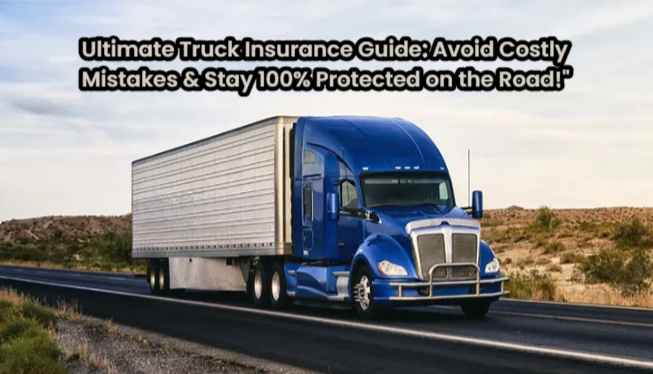Truck insurance is more than just a cost. It’s a crucial safety net for truckers, fleet owners, and freight operators on the unpredictable roads. From accidents to cargo protection, having the right coverage ensures you’re prepared for anything that comes your way. This guide covers all you need about truck insurance. We’ll look at coverage types, cost factors, and FAQs. This will help you choose the best option for your business.
Why Truck Insurance is Essential
Imagine you’re hauling a high-value shipment across state lines when, out of nowhere, another vehicle causes an accident. Without proper insurance, you could be facing massive repair costs, cargo losses, and legal liabilities. Truck insurance protects your vehicle and your business. It acts as a financial shield for your livelihood.
Beyond financial security, truck insurance is a legal requirement. Federal and state rules require commercial trucks to have basic insurance. The amount depends on things like cargo type, vehicle weight, and the routes they operate on. Not keeping the required insurance can lead to serious penalties. This may include large fines and losing your operating license.

Types of Truck Insurance Coverage
Trucking businesses each have unique needs. Truck insurance provides different coverage options to handle various risks:
1. Liability Insurance
Liability insurance is the foundation of any truck policy. If you’re at fault in an accident, this coverage pays for:
- Bodily injury to other parties
- Property damage to other vehicles, buildings, or road structures
- Legal fees and medical expenses
If your truck crashes into another vehicle, liability insurance pays for repairs and medical bills for the other party.
2. Physical Damage Coverage
Keeps your truck safe from damage due to collisions, theft, vandalism, fire, or natural disasters. It includes:
- Collision Coverage: Covers repairs or replacement costs if your truck is damaged in an accident.
- Comprehensive Coverage: Covers non-collision events like fire, theft, weather damage, and vandalism.
3. Cargo Insurance
Covers the goods you transport in case of damage or loss due to accidents, theft, or unforeseen incidents. If your cargo gets destroyed in a crash, this coverage helps recover your financial losses.
4. Non-Trucking Liability Insurance (Bobtail Insurance)
If you drive your truck for personal use when it’s not under dispatch, this coverage protects you in case of accidents.
5. Trailer Interchange Insurance
If you frequently haul trailers that you don’t own, this policy covers damages to those trailers while they’re in your care.
6. Umbrella Insurance
Gives extra liability protection beyond standard policy limits. This helps shield you from big lawsuits and major losses.
How Truck Insurance Works
Purchasing a Policy
To choose the right truck insurance, first, assess your needs. Look at your truck type, cargo value, operating routes, and compliance requirements. Working with an insurance expert can help you find a policy that aligns with your business goals.
Filing a Claim
If an accident occurs, promptly report it to your insurance provider. The process usually involves:
- Documenting the incident
- Gathering witness statements and police reports
- Obtaining repair estimates
Maintaining Compliance
To follow federal and state trucking laws, make sure your insurance covers the minimum requirements. Regularly review your policy to ensure it aligns with evolving regulations and business needs.
Factors Affecting Truck Insurance Costs
Your insurance premiums depend on several factors, including:
1. Driving Record
A clean driving history with few accidents means lower premiums. But if you have frequent violations, your costs will go up.
2. Type of Truck & Cargo
Heavy trucks and those with hazardous or valuable goods usually have higher premiums. This is because they carry more risks.
3. Operating Radius
Long-haul and interstate trucking often have higher insurance rates compared to local routes.
4. Deductibles & Coverage Limits
Opting for higher deductibles can lower premiums, but it means higher out-of-pocket costs if you file a claim.
5. Safety Measures
Installing safety features, such as GPS tracking and anti-theft devices, can get you discounts on insurance. Driver training also helps.
6. Claims History
Frequent insurance claims signal higher risks to insurers, potentially increasing your premiums.
Must read:
- Don’t Risk It! The Shocking Truth About Commercial Vehicle Insurance You NEED to Know!
- NJM Insurance EXPOSED: Shocking Truths & Must-Know Secrets for 2025!
- Shocking Truth About Guaranteed Issue Life Insurance – The ONLY Guide You’ll Ever Need!
FAQs About Truck Insurance
Is truck insurance legally required?
Yes, federal and state laws require commercial trucks to have minimum liability insurance. There are extra rules based on the type of cargo and where the truck operates.
How can I lower my truck insurance costs?
Maintain a clean driving record
Invest in safety technology
Bundle policies with the same insurer
Choose higher deductibles (if financially feasible)
Implement driver training programs
What happens if I don’t have truck insurance?
Operating without insurance can lead to legal penalties and fines. You might also lose your operating authority. In case of accidents, the financial losses can be severe.
Can I get coverage for my cargo?
Cargo insurance protects your goods during transport. It covers damage, theft, or loss while in transit.
How do I choose the right truck insurance provider?
Find insurers who know the trucking industry well. Look for good prices, great customer service, and coverage options that fit your needs.
Final Thoughts: Securing Your Future on the Road
Truck insurance goes beyond legal needs. It protects your business, assets, and livelihood. The right coverage gives you peace of mind. It protects you financially from unexpected challenges on the road.
Know your options, compare policies, and take steps to lower risks. This way, your trucking business can run smoothly and safely. No matter if you run your own truck or manage a big fleet, getting good truck insurance is a smart choice for your business.